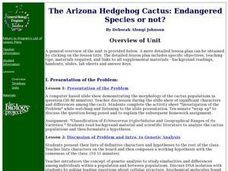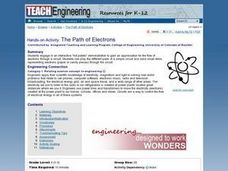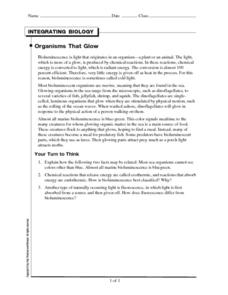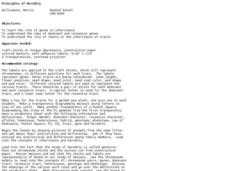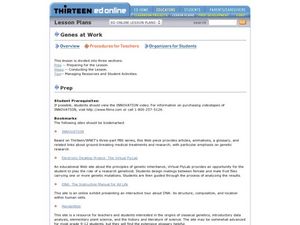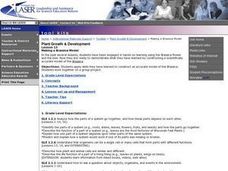Curated OER
The Arizona Hedgehog Cactus: Endangered Species or not?: Biology, Plants
In this lesson students will study the: "Classification of Echinocereus triglochidiatus and Geographical Ranges of its Varieties." Students read background material and scientific literature to analyze the cactus populations and then...
Curated OER
The Path of Electrons
Young scholars engage in an interactive "hot potato" demonstration to gain an appreciation for the flow of electrons through a circuit. They role play the different parts of a simple circuit and send small items representing electrons...
Curated OER
Science Lesson: Chocolate Flavored Cherries
Learners are able to identify start and stop sequences in DNA. They are able to model using restriction enzyme and ligase to remove sections of DNA and reattach them. Students are introduced to the process of recombinat DNA through the...
Curated OER
Eutrophication Experiments
Observe two different water samples and write down observations. Write a paragraph which predicts the relative amounts of nutrients, nitrates, and phosphates in the water samples. Compare water samples under a microscope.
Curated OER
Introduction to Chemistry
In this introduction to chemistry activity, students answer 9 questions regarding the study of chemistry. The first part is matching, then they "think like a scientist" and then they problem solve.
Curated OER
Organisms that Glow
In this bioluminescence worksheet, students read about various organisms that glow on land and in the sea. They answer three critical thinking questions after reading about these chemical reactions.
Curated OER
Principles of Heredity
Students model traits on genes using colored paper and tongue depressors to represent chromosomes. In this heredity lesson plan, students use their "chromosome sticks" to understand chromosome pairs, genes, dominant traits, recessive...
Curated OER
Genes at Work
Students explore and discuss genetics stories and answer questions about genetic outcomes of offspring. In this genetics lesson, students read genetics stories on a web site. Students use a chart to answer questions regarding the...
Curated OER
Microorganisms: Good Guys or Bad Guys?
Students discover the role microorganisms play in our lives. In this decomposition lesson, students examine decaying foods and plants in order to analyze the different bacteria that grows. Students discuss the good and bad of...
Curated OER
Recycling Blackout Worksheet
In this recycling vocabulary worksheet, students read 15 clues that include both a definition and word puzzle. Students must decide what recycling word the definition and puzzle describes and write the word on the line provided.
Curated OER
Percents and Money
In this algebra learning exercise, students rewrite word problems using algebraic symbols. They solve for the amount of population or money over a period of time. There are 10 questions with an answer key.
Curated OER
Dietary Fiber
Students examine the different types of fiber and their benefits. In this investigative lesson students find good sources of fiber in different foods.
Curated OER
Making Paper
Students explore paper making. In this cross curriculum multicultural ecology and art lesson plan, students follow written and oral instructions to make paper using common household items. Students predict the amount of paper use in...
Curated OER
WiTricity Explained
Students explain how electricity is transferred from source to load without actual wires connecting the two. In this physics lesson, students explore how wireless electricity was discovered. They cite practical applications of this...
Curated OER
Can Photosynthesis Occur at Saturn?
Students identify the different requirements for photosynthesis to take place. In this space science lesson, students simulate conditions in Saturn to investigate if photosynthesis is possible there. They use data and observations...
Curated OER
Mass Measurement
Middle schoolers explore geometry by completing a physics activity on-line. In this mass measurement lesson, pupils define the terms mass, volume, and density and identify their relationship with each other. They complete an on-line...
Curated OER
Foods for Better Health
Learners define biotechnology and discuss the economic impact of biotechnology. They also describe what a 1015 onion and a slow-softening tomato are and how they are produced. They examine the safety of genetically-engineered or altered...
Curated OER
Learning About Magnets
Students discuss which objects attract magnets and which ones will not. They work in small groups to to discuss the concept of magnets and why certain objects attract magnets and some don't and then they experiment with them.
Curated OER
Science Puzzlers, Twisters, and Teasers: The History of Life on Earth
A somewhat amusing assignment, this worksheet lists statements that an ancient organism may have made and asks learners to determine what geologic era that each may have lived in. It uses witty word puzzles and fill-in-the-blank-style...
Curated OER
Writing an Essay- The Circulatory System
Fifth graders write an essay. In this writing lesson, 5th graders research the circulatory system and organize their notes into an outline. Students write an informational essay on the circulatory system.
Curated OER
Ferns and Gymnosperms
In this fern and gymnosperm worksheet, students will read about two types of vascular tissue: xylem and phloem. Then students will read about the difference between sporophytes and gametophytes. Using this information students will...
Curated OER
Continuing Life
In this reproduction worksheet, students will review the genetic processes in sexual reproduction and asexual reproduction by answering 6 true or false statements. Then students will complete 2 short answer questions about the offspring...
Curated OER
Making a Brassica Model
Middle schoolers apply skills they have learned to construct an accurate model of the Brassica and then work together on a group project. They analyze how the parts of a system go together, and how these parts depend on each other. ...
Curated OER
Life Cycles of Mosses, Ferns, and Conifers
In this plant life cycle worksheet, students compare the life cycles of mosses, ferns, and conifers. This worksheet has 15 fill in the blank and 10 short answer questions.
Other popular searches
- Animal and Plant Cells
- Specialized Plant Cells
- Animal Cells Plant Cells
- Animals and Plant Cells
- Animal & Plant Cells
- Compare Plant Animal Cells
- Animal Plant Cells
- Plant Cells Photosynthesis
- Plant Cells Edible Projects
- Label Plant and Animal Cells
- Plant Animal Cell Diagram
- Plant Cells Organelles


